英语演讲的艺术week-two
- 格式:ppt
- 大小:1.92 MB
- 文档页数:41
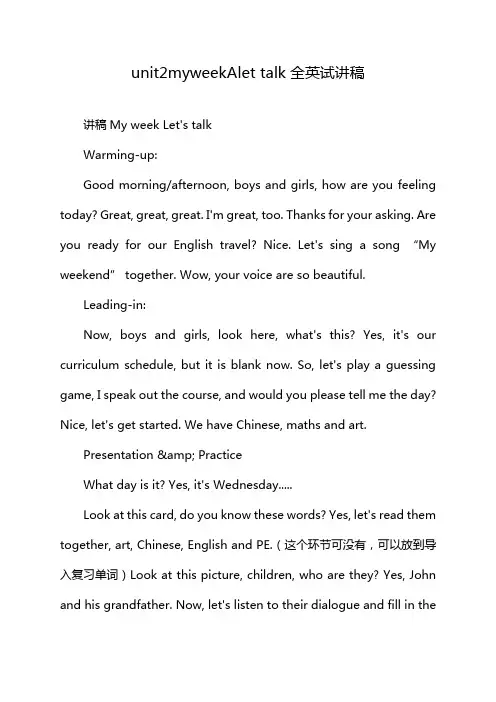
unit2myweekAlet talk全英试讲稿讲稿My week Let's talkWarming-up:Good morning/afternoon, boys and girls, how are you feeling today? Great, great, great. I'm great, too. Thanks for your asking. Are you ready for our English travel? Nice. Let's sing a song “My weekend” together. Wow, your voice are so beautiful.Leading-in:Now, boys and girls, look here, what's this? Yes, it's our curriculum schedule, but it is blank now. So, let's play a guessing game, I speak out the course, and would you please tell me the day? Nice, let's get started. We have Chinese, maths and art.Presentation & PracticeWhat day is it? Yes, it's Wednesday.....Look at this card, do you know these words? Yes, let's read them together, art, Chinese, English and PE.(这个环节可没有,可以放到导入复习单词)Look at this picture, children, who are they? Yes, John and his grandfather. Now, let's listen to their dialogue and fill in theblank? OK, tape is over. Who wants to show your answer? James, please. If you were John, what do you have Wednesdays? Very good, I have English and art.How about you, boys and girls, what do you have on Wednesdays?Diana, please. I have maths and PE. Well done, sit down please. Look at this picture once again, what day is it? // It's Wednesday. What date is it?// It's 22th. What are they talking about? You are not so sure. That's OK. Let's listen to the dialogue and find out the answer. Stop here. Who can tell me what they are talking about? Selena please. They are talking about time arrangement and activities in a week. So, What does John have on Thursdays? Who's John's music teacher? What does John's grandfather do on Thursdays? You don't know. That's OK. Let's listen to the dialogue for a second time to find out the answer. // Tape is over. What does John have on Thursdays? How about Bob?Yes, he has maths, English and music. Who is John's music teacher? Let's say it together. Yes, Mr. Young. How about John's grandpa? What does he do on Thursdays? Any volunteers? Bree, brave girl. He has a cooking class. Brilliant! John's grandpa said: I have a cooking class with your grandma.So much for John. How about you, boys and girls, what do you have on Thursdays? Linda, please. I have Chinese and music. Excellent. Sit down please.(板书句型,并根据时间提问2-3次)Children, would you please make a new dialogue based on what we have learnt. 3 minutes for you. Time's up. Who want to show your result. Wow, so many of you want to have a try. Who should I choose? How about “Hot potato” game? Here is the potato. Remember, it is so hot, so please pass it as quickly as you can. Ready? Go. Stop here, wow, Dean how lucky you are, who is your partner? Yes, Maria please. Very fluently, I love your pronunciation. Sit down please. Now, children, let's read the dialogue following the tape, during your listening, please pay attention to your pronunciation and intonation.ProductionChildren, do you still remember your group member. Nice, I will give each of you a blank schedule. Work in group to finish activities you want to have. Then, each group choose a representative to show your results. I will give you five minute, here we go. Time's up. Who wants to show your results, yes, group 2, please. You would like tohave some outdoor activities on weekends. And from Monday toFriday, you want to learn at school. Wow, amazing. Sit down please.Ss summarize and teacher give supplement timely.Talk about activities and time arrangement with their friends or family members. Next class, share their informationThat’s all, thank you.May I clean my blackboard?。
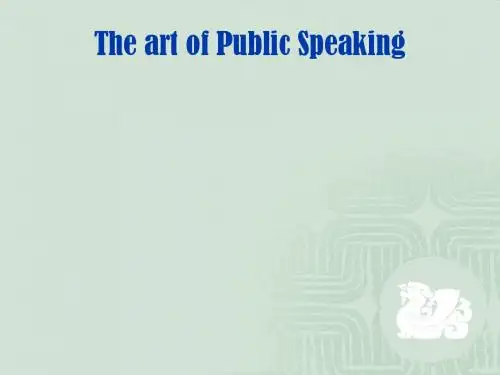
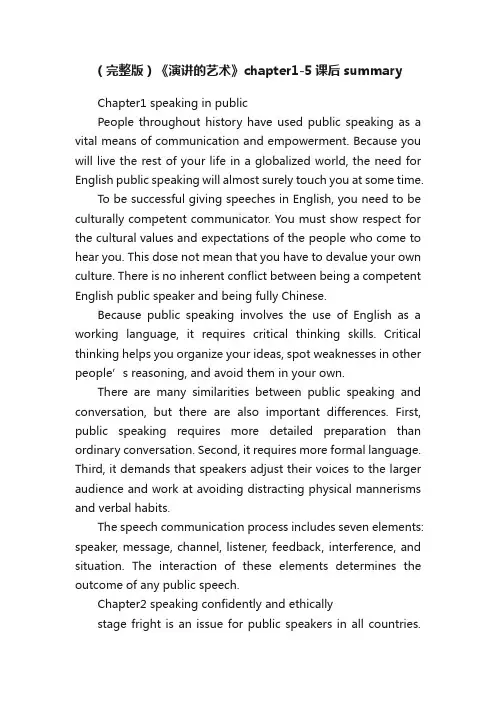
(完整版)《演讲的艺术》chapter1-5课后summaryChapter1 speaking in publicPeople throughout history have used public speaking as a vital means of communication and empowerment. Because you will live the rest of your life in a globalized world, the need for English public speaking will almost surely touch you at some time.To be successful giving speeches in English, you need to be culturally competent communicator. You must show respect for the cultural values and expectations of the people who come to hear you. This dose not mean that you have to devalue your own culture. There is no inherent conflict between being a competent English public speaker and being fully Chinese.Because public speaking involves the use of English as a working language, it requires critical thinking skills. Critical thinking helps you organize your ideas, spot weaknesses in other people’s reasoning, and avoid them in your own.There are many similarities between public speaking and conversation, but there are also important differences. First, public speaking requires more detailed preparation than ordinary conversation. Second, it requires more formal language. Third, it demands that speakers adjust their voices to the larger audience and work at avoiding distracting physical mannerisms and verbal habits.The speech communication process includes seven elements: speaker, message, channel, listener, feedback, interference, and situation. The interaction of these elements determines the outcome of any public speech.Chapter2 speaking confidently and ethicallystage fright is an issue for public speakers in all countries.Rather than trying to eliminate every trace of stage fright, you should try to transform it into positive energy. To some extent, this will happen naturally as you gain experience as a speaker, but you should also think positively, prepare thoroughly, visualize yourself giving a successful speech, remember that most nervousness is not visible to the audience, and think of your speech as communication rather than as a performance in which you must do everything perfectly Because public speaking is a form of power, it carries with it heavy ethical responsibili ties. There are four basic guidelines for ethical speechmaking. The first is to make sure your goals are ethically sound. The second is to be fully prepared for each speech. The third is to be honest in what you say. The fourth is to put ethical principles into practice at all timesOf all the ethical lapses a speaker can commit, few are more serious than plagiarism lobal plagiarism is lifting a speech entirely from a single source. Patchwork plagiarism involves cutting and pasting a speech from a limited number of sources. Incremental pla giarism occurs when a speaker fails to give credit for specific quotations and paraphrases that are borrowed from other people Because it is so easy to copy information from the Internet, it poses special challenges with regard to plagiarism. If you don't cite Internet sources, you are just as guilty of plagia- rism as if you take information from print sources without proper citation. As you research your speeches, be sure to take accurate notes of the Internet sources you use so you can identify them in your speechChapter3 giving your first speechOne of your first assignments will be to present an introductory speech, either a speech of self-introduction or aspeech introducing a classmate. Focus the speech on a limited number of ideas and be creative in developing them. Use interesting supporting materials and present them in colorful, descriptive language.When organizing the speech, make sure you have a clear introduction, body, and conclusion. Most introductory speeches fall naturally into chronological or topical order. Using clear transitions will help your audience follow you from point to point.Although you will write a complete manuscript or outline of your speech when preparing it, you should deliver it extemporaneously. This means you have rehearsed fully and can present your talk from a brief set of speaking notes. Concentrate on establishing eye contact with the audience and on speaking in a dynamic, engaged tonof voiceChapter4 selecting a topic and purposeThe first step in speechmaking is choosing a topic. If you have trouble picking a topic, you can use clustering, a personal inventory, or an Internet search to come up with something that is right for you.The general purpose of your speech will usually be to inform or to persuade. When your general purpose is to inform, your goal is to communicate information clearly, accurately, and interestingly. When your general purpose is to persuade, your goal is to win listeners over to your point of viewOnce you know your topic and general purpose, you must focus on a specific purpose statement that indicates precisely what your speech seeks to achieve. The specific purpose statement should (1) be a full infinitive phrase; (2) be worded as a statement, not a question:(3) avoid figurative language;(4) not be vague or general; (5) be appropriate for your audience; and(6)be achievable in the allotted time.The central idea is a concise statement of what you will say in your speech, and it usually crystallizes in your thinking after you have done your research and have decided on the main points. In most cases, it encapsulates the main points in a single declarative sentence Chapter5 analyzing the audience Good speakers are audience-centered. When working on your speeches, keep three questions in mind: To whom am I speaking? What do I want them to know, believe, or do as result of my speech? What is the most effective way of composing and presenting my speech to accomplish that aim?People are egocentric. They typically approach speeches with one question uppermost in mind: "why is this important to me?" Therefore you need to study your audience and adapt your speech to their beliefs and interests.The major factors to consider in audience analysis are size, physical setting, demographic traits disposition toward the topic, disposition toward the speaker, and disposition toward the occasion, For speeches outside the classroom, you can get information about the audience by asking the person who invites you to speak. For classroom speeches, you can circulate an audience-analysis questionnaire.Once you complete the audience analysis, you must adapt your speech so it will be clear and convincing. Try to hear the speech as your listeners will. Anticipate questions and objections, and try to answer them in advance. When you deliver the speech, keep an eye out for audience feedback, and adjust your remarks in response. After the speech, think about your audience's response and about changes you would make if you were delivering the speech again。

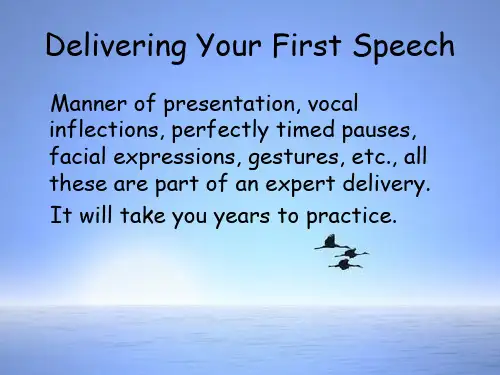
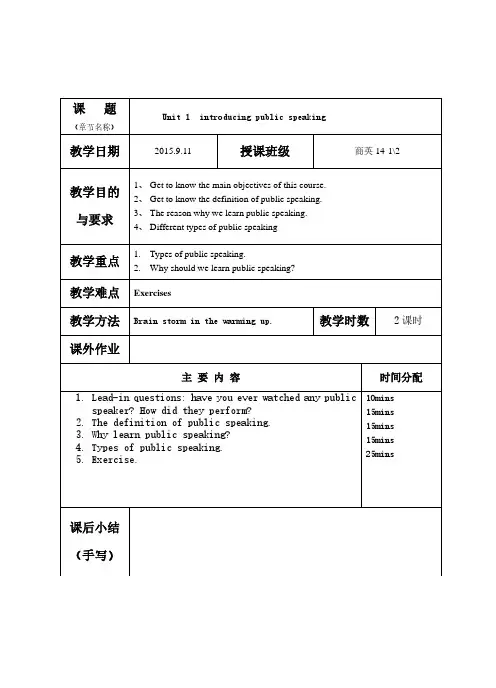
Speech Analysis: I Have a Dream – Martin Luther King Jr.Speech Video: Martin Luther King Jr. delivers “I Have a Dream”I encourage you to:1.Watch the video;2.Read the analysis in this speech critique;3.Study the speech text in the completetranscript; and4.Share your thoughts on this presentation.Speech Critique –I Have a Dream –Martin Luther King Jr.Much of the greatness of this speech is tied to its historical context, a topic which goes beyond the scope of this article. Analyze thespeech20mins主要内容教学思路时间分配Our privacy on the internet should be more protectedA good thesis for a speech could be: privacy on the Internet should be more protected by a ban on identity theft and safeguard genetic information, because everybody has the fundamental rights to have absolute control over his or her personal information.Does it introduce the contestable point and the claim you want to make?Is it not too board? Can you discuss the issue and claim in the given time limit?Does it announce what the audience should do, think or feel? Does it reveal the main speech topic?Is it simple, clear, and most and for all, direct?Is the speech thesis easy to remember and understand for them?Does it gain interest?Does it say way it is important?Does it contain a benefit?Exercise How to presentyourspeechthesis40mins20课题(章节名称)Unit5 constructing basic structure of a speech。

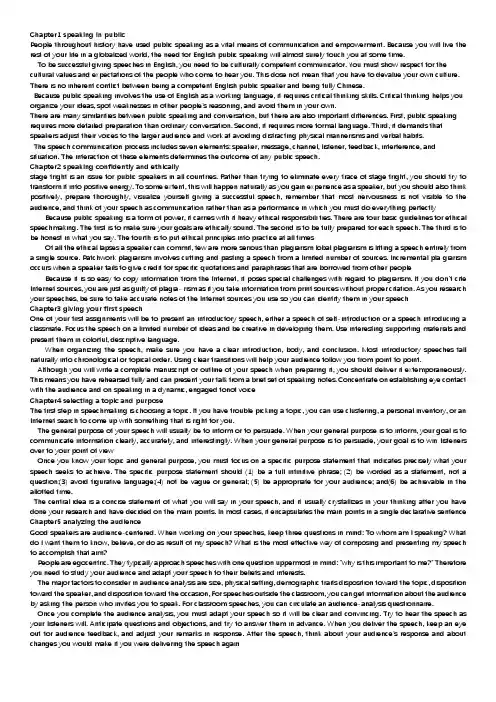
Chapter1 speaking in publicPeople throughout history have used public speaking as a vital means of communication and empowerment. Because you will live the rest of your life in a globalized world, the need for English public speaking will almost surely touch you at some time.To be successful giving speeches in English, you need to be culturally competent communicator. You must show respect for the cultural values and expectations of the people who come to hear you. This dose not mean that you have to devalue your own culture. There is no inherent conflict between being a competent English public speaker and being fully Chinese.Because public speaking involves the use of English as a working language, it requires critical thinking skills. Critical thinking helps you organize your ideas, spot weaknesses in other people’s reasoning, and avoid them in your own.There are many similarities between public speaking and conversation, but there are also important differences. First, public speaking requires more detailed preparation than ordinary conversation. Second, it requires more formal language. Third, it demands that speakers adjust their voices to the larger audience and work at avoiding distracting physical mannerisms and verbal habits.The speech communication process includes seven elements: speaker, message, channel, listener, feedback, interference, and situation. The interaction of these elements determines the outcome of any public speech.Chapter2 speaking confidently and ethicallystage fright is an issue for public speakers in all countries. Rather than trying to eliminate every trace of stage fright, you should try to transform it into positive energy. To some extent, this will happen naturally as you gain experience as a speaker, but you should also think positively, prepare thoroughly, visualize yourself giving a successful speech, remember that most nervousness is not visible to the audience, and think of your speech as communication rather than as a performance in which you must do everything perfectly Because public speaking is a form of power, it carries with it heavy ethical responsibili ties. There are four basic guidelines for ethical speechmaking. The first is to make sure your goals are ethically sound. The second is to be fully prepared for each speech. The third is to be honest in what you say. The fourth is to put ethical principles into practice at all timesOf all the ethical lapses a speaker can commit, few are more serious than plagiarism lobal plagiarism is lifting a speech entirely from a single source. Patchwork plagiarism involves cutting and pasting a speech from a limited number of sources. Incremental pla giarism occurs when a speaker fails to give credit for specific quotations and paraphrases that are borrowed from other people Because it is so easy to copy information from the Internet, it poses special challenges with regard to plagiarism. If you don't cite Internet sources, you are just as guilty of plagia- rism as if you take information from print sources without proper citation. As you research your speeches, be sure to take accurate notes of the Internet sources you use so you can identify them in your speechChapter3 giving your first speechOne of your first assignments will be to present an introductory speech, either a speech of self-introduction or a speech introducing a classmate. Focus the speech on a limited number of ideas and be creative in developing them. Use interesting supporting materials and present them in colorful, descriptive language.When organizing the speech, make sure you have a clear introduction, body, and conclusion. Most introductory speeches fall naturally into chronological or topical order. Using clear transitions will help your audience follow you from point to point.Although you will write a complete manuscript or outline of your speech when preparing it, you should deliver it extemporaneously. This means you have rehearsed fully and can present your talk from a brief set of speaking notes. Concentrate on establishing eye contact with the audience and on speaking in a dynamic, engaged tonof voiceChapter4 selecting a topic and purposeThe first step in speechmaking is choosing a topic. If you have trouble picking a topic, you can use clustering, a personal inventory, or an Internet search to come up with something that is right for you.The general purpose of your speech will usually be to inform or to persuade. When your general purpose is to inform, your goal is to communicate information clearly, accurately, and interestingly. When your general purpose is to persuade, your goal is to win listeners over to your point of viewOnce you know your topic and general purpose, you must focus on a specific purpose statement that indicates precisely what your speech seeks to achieve. The specific purpose statement should (1) be a full infinitive phrase; (2) be worded as a statement, not a question:(3) avoid figurative language;(4) not be vague or general; (5) be appropriate for your audience; and(6) be achievable in the allotted time.The central idea is a concise statement of what you will say in your speech, and it usually crystallizes in your thinking after you have done your research and have decided on the main points. In most cases, it encapsulates the main points in a single declarative sentence Chapter5 analyzing the audienceGood speakers are audience-centered. When working on your speeches, keep three questions in mind: To whom am I speaking? What do I want them to know, believe, or do as result of my speech? What is the most effective way of composing and presenting my speech to accomplish that aim?People are egocentric. They typically approach speeches with one question uppermost in mind: "why is this important to me?" Therefore you need to study your audience and adapt your speech to their beliefs and interests.The major factors to consider in audience analysis are size, physical setting, demographic traits disposition toward the topic, disposition toward the speaker, and disposition toward the occasion, For speeches outside the classroom, you can get information about the audience by asking the person who invites you to speak. For classroom speeches, you can circulate an audience-analysis questionnaire.Once you complete the audience analysis, you must adapt your speech so it will be clear and convincing. Try to hear the speech as your listeners will. Anticipate questions and objections, and try to answer them in advance. When you deliver the speech, keep an eye out for audience feedback, and adjust your remarks in response. After the speech, think about your audience's response and about changes you would make if you were delivering the speech again。
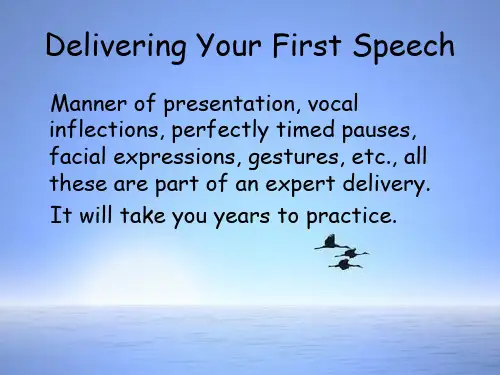
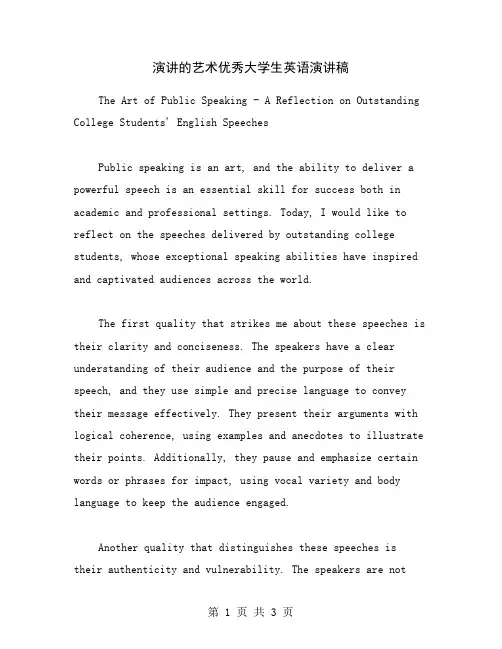
演讲的艺术优秀大学生英语演讲稿The Art of Public Speaking - A Reflection on Outstanding College Students' English SpeechesPublic speaking is an art, and the ability to deliver a powerful speech is an essential skill for success both in academic and professional settings. Today, I would like to reflect on the speeches delivered by outstanding college students, whose exceptional speaking abilities have inspired and captivated audiences across the world.The first quality that strikes me about these speeches is their clarity and conciseness. The speakers have a clear understanding of their audience and the purpose of their speech, and they use simple and precise language to convey their message effectively. They present their arguments with logical coherence, using examples and anecdotes to illustrate their points. Additionally, they pause and emphasize certain words or phrases for impact, using vocal variety and body language to keep the audience engaged.Another quality that distinguishes these speeches istheir authenticity and vulnerability. The speakers are notafraid to share their personal stories or opinions, even if they are controversial or unpopular. They speak from the heart, and their passion and conviction are palpable in their delivery. This authenticity allows them to connect with their audience on a deeper level, inspiring and motivating them to take action or think differently.Furthermore, these speeches demonstrate a deep appreciation for diversity and inclusivity. The speakers acknowledge and celebrate the differences among individuals and communities, and they advocate for greater understanding and acceptance. They use their platform to raise awareness of social issues, to challenge stereotypes and biases, and to promote a more equitable and just society.Lastly, these speeches reflect a strong sense of purpose and commitment. The speakers are not simply delivering a speech for the sake of it - they have a clear goal in mind, and they are passionate about making a difference. Whether they are advocating for environmental sustainability, promoting mental health awareness, or challenging gender norms, they demonstrate a deep sense of responsibility to their community and to the world.In conclusion, the art of public speaking is amultifaceted and complex skill that requires clarity, authenticity, inclusivity, and purpose. The speechesdelivered by outstanding college students embody these qualities, inspiring and empowering audiences across the world. As we navigate the challenges and opportunities of the 21st century, we must continue to cultivate this essential skill, recognizing the power of our words to change the world.。
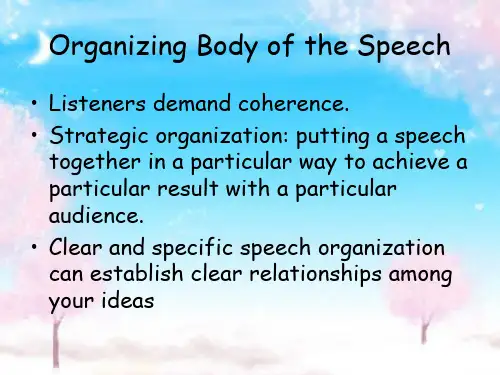
小乔布斯thomas suarez英语演讲稿tedhello everyone,my name is thomas suarez. i've always had a fascination for puters and technology, and i made a few apps for the iphone, ipod touch and ipad. i’d like to share a couple with you today; my first step was a unique fortune terror called earth fortune, that explain different codes of earth depending on what your fortune was, my favorite and most successful app is bustin jieber, which is the justin bieber wac more, i created it because a lot of people at school dislike justin bieber a little bit, so i decided to make the app, so i went to work programming it and i really suggest for holidays in 2014.大家好,我叫托马斯·斯沃斯,我一直以来对计算机技术着迷。
我就给iphone、ipod touch、ipad做了一些应用程序,今天我就来给大家展示几个。
第一个应用叫做地球算命,它根据你的运势来改变地球的颜色。
我最有名、最成功的应用程序是比斯汀.贾伯,它是一个恶搞贾斯汀·比伯程序。
这是因为在我的学校里,许多人有点不喜欢贾斯汀·比伯。
我的周末英语2分钟演讲作文It is Friday afternoon, and the school bell has just rung, signaling the start of the weekend. As I gather my books and head out the door, I can't help but feel a sense of excitement and anticipation for the next two days. The weekend is a time for me to recharge, explore new interests, and spend quality time with friends and family.On a typical weekend, I like to start my mornings by sleeping in and enjoying a leisurely breakfast. I find that this time of relaxation and rejuvenation sets the tone for the rest of the day. After breakfast, I might go for a brisk walk or run outdoors, taking in the fresh air and beautiful scenery around me. Exercise not only keeps me physically fit, but it also clears my mind and boosts my mood.In the afternoons, I often engage in a variety of hobbies and activities. One of my favorite pastimes is reading, and I try to set aside a few hours each weekend to dive into a good book. Whether it's a thought-provoking novel, a captivating biography, or a informative non-fiction work, reading helps me to expand my knowledge and stimulate my imagination. I also enjoy pursuing myartistic interests, such as painting or drawing. The act of creating something from scratch is not only fulfilling, but it also allows me to express my emotions and individuality.Another important aspect of my weekends is spending time with friends and family. I make a conscious effort to schedule social activities, such as going to the movies, having a picnic in the park, or simply catching up over a cup of coffee. These shared experiences not only strengthen my relationships, but they also provide a much-needed break from the routine of the work week.In addition to leisure activities, I also try to use my weekends to be productive and accomplish tasks that I've been putting off during the week. This might include doing laundry, running errands, or tackling a household project. While these chores may not be the most exciting way to spend my time, I find a sense of satisfaction in crossing items off my to-do list and maintaining a well-organized and tidy living space.As the sun begins to set on my weekend, I often take some time to reflect on the past two days and plan for the week ahead. I think about the memories I've made, the goals I've accomplished, and the lessons I've learned. This introspection helps me to stay grounded and focused, and it also allows me to approach the new week with a renewed sense of purpose and motivation.In conclusion, my weekends are a valuable and cherished part of my life. They provide me with the opportunity to recharge, explore my interests, and strengthen my relationships with loved ones. Whether I'm engaging in leisurely activities or being productive, I always strive to make the most of my time off and return to the work week feeling refreshed and energized. The weekend is a precious gift, and I am grateful for the chance to enjoy it to the fullest.。
英语演讲的艺术与技巧探讨Exploring the Art and Techniques of English Public SpeakingPublic speaking is a skill that is highly esteemed in today's globalized world. Whether you are a student, a professional, or an aspiring leader, the ability to effectively communicate in English is vital. English public speaking not only helps individuals to express their thoughts and ideas clearly but also enables them to engage with diverse audiences on a global scale. In this article, we will delve into the art and techniques of English public speaking, offering insights and strategies to help you become a confident and persuasive speaker.1. Overcoming the Fear of Public SpeakingIt is common for individuals to feel anxious and nervous about public speaking. The fear of being judged or making mistakes can be overwhelming. However, it is important to remember that even the most experienced speakers had to start somewhere. To overcome this fear, preparation is key. Practice your speech thoroughly and become familiar with the content. Visualize success and focus on the positive outcome of your presentation. Additionally, try deep breathing exercises or seek professional help such as joining a public speaking club to build confidence over time.2. Understanding the Art of StorytellingOne of the most effective ways to engage an audience is through storytelling. People are naturally drawn to narratives that evoke emotions, create connections, and leave a lasting impression. Incorporating personalanecdotes or captivating stories related to the topic can make your speech more relatable and memorable. Craft your narrative with a clear beginning, middle, and end, ensuring a smooth flow of information that resonates with your audience.3. Structuring Your SpeechA well-structured speech is essential for effective communication. Start with a compelling introduction that captures the audience's attention. Provide a clear thesis statement that states the purpose and main points of your speech. Use transitional phrases to smoothly transition between ideas and include supporting evidence and examples to strengthen your arguments. Conclude your speech with a memorable ending that leaves the audience thinking or encourages them to take action.4. Utilizing Language TechniquesLanguage plays a crucial role in conveying your message effectively. Use simple and concise language that is easy for your audience to understand. Avoid using jargon or technical terms unless necessary, and ensure clarity by explaining complex concepts in simpler terms. Utilize rhetorical devices such as metaphors, similes, and vivid descriptions to make your speech more engaging and memorable. Additionally, use a variety of sentence structures to add rhythm and keep the audience's attention.5. Non-verbal CommunicationNon-verbal communication, including body language and vocal delivery, greatly influences how your message is received. Maintain good posture, make eye contact, and use hand gestures purposefully to enhance yourspeech. Vary your tone, volume, and pace to add emphasis and convey emotions effectively. Pay attention to your facial expressions and maintain a warm and confident demeanor throughout your presentation.6. Engaging with the AudienceEngagement is the key to capturing and maintaining the audience's attention. Interact with your audience by asking rhetorical questions or using humor, where appropriate. Use visual aids such as slides or props to support your speech and reinforce key points. Additionally, be open to questions and actively involve the audience by encouraging their participation through interactive activities or discussions.7. Practice and FeedbackRegular practice is essential for honing your public speaking skills. Rehearse your speech multiple times, preferably in front of a mirror or a supportive audience. Pay attention to areas that need improvement, such as pacing, clarity, or gestures. Record your practice sessions and seek feedback from mentors, colleagues, or friends. Constructive criticism will help you identify your strengths and weaknesses, enabling you to continually refine your skills.In conclusion, English public speaking is an art that can be mastered with the right techniques and practice. Overcoming the fear of public speaking, embracing storytelling, structuring your speech effectively, utilizing language techniques, focusing on non-verbal communication, engaging with the audience, and seeking regular feedback are all fundamental aspects to become a proficient and captivating English speaker. With dedication and perseverance, you can unlock the power of Englishpublic speaking, empowering yourself to communicate confidently and persuasively in any professional or personal setting.。